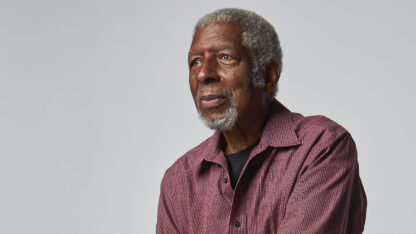Type “running playlist” into Spotify’s search bar and you’ll find yourself scrolling through an endless parade of high-energy tunes that ought to, in theory, propel listeners forward on their exercise journey.
“Hype Running Mix,” is full of hyper-pop and EDM; “Pump Up Running Mix” careens full-tilt with gangster hip-hop and trap. The general consensus among runners (and scientists) lands roughly on the idea that music makes you a better athlete. That fast tempo, aggressive or ebullient music propels runners farther and pushes bodies faster.
Singer Lila Ramani runs to freak folk. The music between her headphones needs to be “the most calming, low tempo music,” she told “City Lights” reporter Jacob Smulian in an interview earlier this month.
She admits that this might sound a bit “counterintuitive, but it works” for her. Running is a new addition to her life, but she’s a veteran of laying down hypnotic rhythms that have kept fans moving for the better part of a decade.
Eight years ago, Ramani and four friends arranged and recorded a small collection of songs, based mostly off of lyrics and melodies that Ramani had dreamt up in her late teen years. This amalgamation of ideas eventually morphed into Crumb, a psychedelic rock band propelled by Ramani’s trippy, lilting vocals, sung over a jazz-infused indie soundscape.
In May, nearly a decade after releasing their still-popular self-titled EP, Crumb released their third full-length album, “AMAMA,” to widespread acclaim.
The album’s release is supported by a tour of the Americas, starting in Nashville, Tennessee, and ending in Porto Alegre, Brazil. The band will be in Atlanta at The Buckhead Theatre on Aug. 25.
Below are some highlights from Ramani’s conversation on “City Lights”:
This interview has been edited for clarity.
Nilüfer Yanya or Jessica Pratt?
“Both. Definitely. They bring different energies, but I’m a big fan of both of them. I just recently saw Jessica Pratt here in New York, like a couple of weeks ago, and it was beautiful. I run to her music. I only started running recently and I realized that if I’m going to listen to music, it needs to be like the most calming, low tempo music. Which is kind of counterintuitive, but it works for me.”
Weird recording techniques on AMAMA:
“It’s funny that we’re known for weird recording techniques [laughs]. I think there was a moment of using Silly Putty on the piano strings and a sax mouthpiece solo. And a lot of digital weird techniques. [Using Ableton], pitch shifting the wrong way. There were a lot of cooks in the kitchen recording studio. So I feel like a lot of cool stuff popped up.
Managing creative differences in Crumb:
“Oh, that’s a big one [laughs]. It’s a lifelong journey; I think we all try to get our voices into the songs one way or another but also just stay faithful to like the song itself. We won’t work on a song unless it’s all four of us. It’s like having a song take on its own journey and not inserting yourself too much into it. I think it’s just compromise. We have a pretty democratic process, but it is hard a lot of the time. Especially for me, because a lot of the times [that] I’m writing the traditional songwriting stuff. [It’s] kind of like letting my ego go and just opening it up to the four voices and the collaboration.”
Non-musical inspiration
“I’ve talked a lot about my family and how it influenced the album literally and I think for the ones that I was demoing on my own, I was getting inspired by sound or little samples and kind of using that as like a starting point for like the song – As opposed to just laying down some chords. More just things out in the wild – either on the internet or Whatsapp – in this digital landscape that is infinite.”
Working with “Aint Wet“
“‘Aint Wet‘ is primarily Abraham “Abe” El Makawy, who is my partner, who I live with. And his longtime friend and partner, Mikey, who does more of the web design stuff. So [we were] mostly working with Abe, which is amazing and a very intimate, collaborative process. We worked with him on Ice Melt, too, but this album felt like he was spearheading all of the visual process elements in a way that was really, really great to see. And we were really happy with how everything came out.”
“He balances his own personal artistic identity with having to work with a bunch of clients and catering to their wants and needs in a really cool way. I think his identity comes through a lot in the work he does for other clients, but maybe in more subtle ways. We had the idea of doing this carpet thing, and then Abe just built this whole world within that structure. I think he’s just done a really amazing job on this album.”
On producer John Scott Sanford
“The man, the mystery. He is someone that we met before we even started this project. He’s running a studio in Somerville, Massachusetts, which is in Boston, right near where we went to college, and we just like found him on the internet. We went to his studio and worked with him prior to being in crumb when he was like, just starting out. He was a college student or just finishing Berkeley or something. When we recorded our first EPs, we worked with him, and I’ve worked with him basically on everything we’ve done except for Ice Melt, for whatever reason. He works primarily with hip-hop artists and, like, pop/hip-hop/rap stuff. So, I think we’re one of the only artists in another genre that he really works with and it’s always really refreshing like on both ends to get to do that with him. His studio in Boston is called Phoenix Down Studios. Maybe that would be easier to look up. He lives in LA.”









